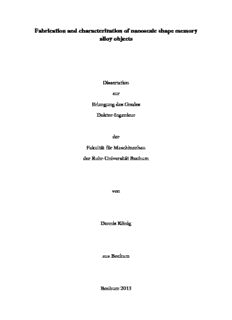Table Of ContentFabrication and characterization of nanoscale shape memory
alloy objects
Dissertation
zur
Erlangung des Grades
Doktor-Ingenieur
der
Fakultät für Maschinenbau
der Ruhr-Universität Bochum
von
Dennis König
aus Bochum
Bochum 2013
Dissertation eingereicht am: 17.10.2013
Tag der Verteidigung: 29.11.2013
Erster Referent: Prof. Dr.-Ing. Alfred Ludwig
Zweiter Referent: Prof. Dr.-Ing. Gunther Eggeler
“If you don't mind, I'd like to stop listening to you and start talking.” – Dr. Sheldon Cooper
For my parents
Contents
1 Introduction..............................................................................................................1
2 Fundamentals......................................................................................................... ..3
2.1 TiNi-based SMAs........................................................................................ ..3
2.1.1 The martensitic transformation in TiNi-based alloys.................................. ..3
2.1.2 The thermal hysteresis – Compatibility of martensite and austenite........... ..7
2.1.3 TiNi-based SMA bulk materials.................................................................. ..9
2.1.4 TiNi-based SMA thin films......................................................................... 16
2.2 Ti-Ni-Cu SMAs........................................................................................... 18
2.2.1 Ti-Ni-Cu SMA bulk materials1................................................................... 18
2.2.2 Ti-Ni-Cu SMA thin films............................................................................ 21
2.3 Constraints on the phase transformation in TiNi-based SMAs................... 23
2.3.1 TiO -surface layer and interfacial reaction layer......................................... 23
x
2.3.2 Grain size effects and energy barriers.......................................................... 25
2.3.3 Constraints imposed by the substrate and stresses in thin films.................. 28
2.4 The electrical resistance of bulk materials, thin films, and ultrathin films.. 31
2.5 Ionic liquids................................................................................................. 33
2.5.1 Nanoparticle synthesis by sputtering into ionic liquids............................... 34
3 Experimental methods........................................................................................... 37
3.1 Sputter deposition of Ti-Ni-Cu SMA thin films.......................................... 37
3.2 Integral composition analysis – Energy dispersive X-ray analysis............. 42
3.3 Depth-resolved composition analysis – X-ray photoelectron...................... 42
spectroscopy
3.4 Structural and stress analysis – X-ray diffraction and temperature-............ 46
dependent X-ray diffraction
3.5 Investigation of phase transformations – Temperature-dependent.............. 47
resistance measurements
3.6 Design and fabrication of a test platform for freestanding SMA thin......... 49
films
3.7 Nanostructuring of thin film objects and ion implantation into thin............50
films – Focused ion beam method
3.8 Direct structuring of nano-objects – E-Beam-Lithography......................... 52
3.9 Microstructural analysis – Scanning electron microscopy and.................... 54
transmission electron microscopy
3.10 Fabrication of elemental, binary and ternary nanoparticles by sputtering... 55
into ionic liquids
4 Results and Discussion.......................................................................................... ..58
4.1 Characterization of the as-deposited Ti Ni Cu SMA thin films...............58
51 38 11
4.2 Thickness-dependence of the transformation properties............................. ..68
4.2.1 Phase transformation temperatures and thermal hysteresis......................... ..69
4.2.2 Structural analysis........................................................................................ ..71
4.2.3 Stress and grain size related effects............................................................. ..77
4.2.4 Interplay between structure and phase transformation properties............... ..79
4.3 The influence of the surface oxide layer and the interfacial layer on.......... ..81
phase transformation properties
4.3.1 Investigation of the transforming matrix phase........................................... ..83
4.3.2 Investigation of surface oxide and interfacial layers................................... ..88
4.4 Test platform for freestanding SMA thin film objects...................................95
4.5 Influence of lateral constraints on the phase transformation....................... ..98
4.5.1 Dependence of phase transformation characteristics on structure width..... ..99
4.5.1.1 Ex-post structuring of substrate-attached and freestanding............. 106
structures by FIB method
4.5.1.2 Direct structuring by electron beam lithography.................. 110
4.5.1.3 Influence of ion implantation during the FIB....................... 115
structuring process
4.5.2 Dependence of phase transformation characteristics on structure length.... 118
4.6 Fabrication of elemental and alloy NPs using magnetron sputtering.......... 119
into an IL
4.6.1 Fabrication and characterization of elemental NPs..................................... 120
4.6.2 Fabrication and characterization of binary Cu-Au alloy NPs...................... 121
4.6.3 Fabrication and characterization of ternary Cu-Au-Pt and Ti-Ni-Cu NPs.. 133
5 Conclusion and Outlook........................................................................................ 144
6 References............................................................................................................... 148
Publications........................................................................................................................ 155
Acknowledgements............................................................................................................157
Curriculum Vitae............................................................................................................... 158
List of abbreviations and symbols
a [nm] lattice parameter of the cubic austenite phase
B2
a [nm] lattice parameter a of the orthorhombic martensite phase
B19
A [°C] austenite finish temperature
f
A [°C] austenite start temperature
s
AES [-] Auger electron spectroscopy
AFM [-] atomic force microscopy
at. % [-] atomic percent
b [nm] lattice parameter b of the orthorhombic martensite phase
B19
B2 [-] cubic austenite phase
B19 [-] orthorhombic martensite phase
B19` [-] monoclinic martensite phase
BCV [-] Bain corresponding variant
c [nm] lattice parameter c of the orthorhombic martensite phase
B19
d [nm] grain size determined from XRD measurements
XRD
DC [A] direct current
DSC [-] differential scanning calorimetry
DHM [-] digital holography microscopy
E [GPa] Young´s modulus
E [eV] binding energy
b
EBL [-] e-beam lithography
EDX [-] energy-dispersive X-ray spectroscopy
FIB [-] focused ion beam
FWHM [-] full width at half maximum
HAADF [-] high-angle annular dark field
HRTEM [-] high-resolution transmission electron microscopy
ICDD [-]
ICSD [-]
IL [-] ionic liquid
MEMS [-] Micro-electro-mechanical system
M [°C] monoclinic martensite finish temperature
f
M [°C] monoclinic martensite start temperature
s
ML [-] multilayer
O [°C] orthorhombic martensite finish temperature
f
O [°C] orthorhombic martensite start temperature
s
PE [-] pseudoelasticity
PVD [-] physical vapor deposition
R [°C] R-phase finish temperature
f
R [°C] R-phase start temperature
s
R-phase [-] trigonal martensite phase
RF [Hz] radio frequency
RT [°C] room temperature
R(T) [] temperature-dependent resistance
SAD [-] selected area diffraction
SEM [-] scanning electron microscope
SIMS [-] secondary ion mass spectrometry
SMA [-] shape memory alloy
SME [-] shape memory effect
STEM [-] scanning transmission electron microscope
TEM [-] transmission electron microscope
T [°C] temperature
TG [-] thermogravimetry
UHV [Pa] ultra-high vacuum
Description:Design and fabrication of a test platform for freestanding SMA thin 49 films. 3.7 for Applied. Plasma Physics of the Ruhr-Universität Bochum in collaboration with PD Dr. Teresa de los definition a value of 1 corresponds to an unstrained lattice between the parental austenitic phase and the

